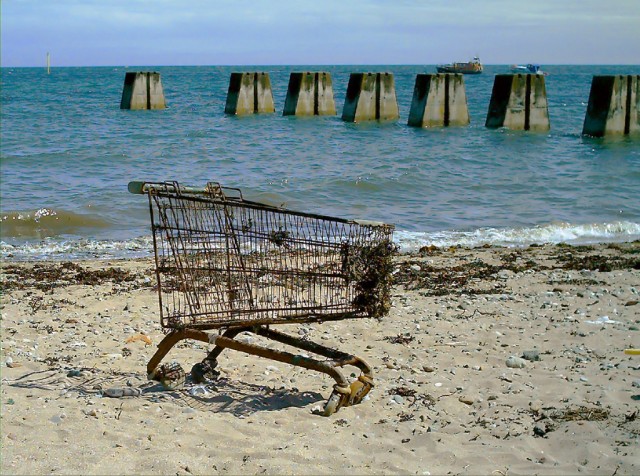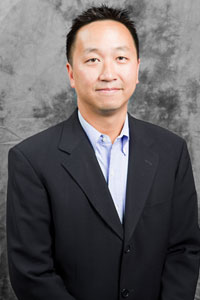
Earlier this year, online retailer Newegg knocked out a software patent that would reach the heights of infamy only after its death—a patent claiming to own the idea of an online "shopping cart." Soverain Software had used that patent (and a few others) to score untold tens of millions in royalty payments. Its fully fleshed-out website is an empty husk, with phone numbers and e-mail addresses that do nothing. At trial, the company admitted to never having made a sale. Soverain is a group of lawyers who hold a batch of patents.
Newegg's victory over Soverain was total; the patents wiped out were key to the troll's success. Soverain, which was expecting more big payments after defeating Avon and Victoria's Secret at trial, was now going to come up empty. "Now, nobody has to pay Soverain jack squat for these patents," Newegg Chief Legal Officer Lee Cheng told Ars after the January ruling.
But Soverain actually had one final trick up its sleeve—a desperate attempt to pull victory from the jaws of defeat that was, in Cheng's telling, effectively based on a typographical error. The appeals court had invalidated claim 34 of the "shopping cart" patent, not claim 35. Instead of allowing what Newegg said was a mistake to be corrected, Soverain tried to literally make a federal case out of it. The patent company asked for a re-hearing from the panel, as well as from the full "en banc" court, saying that after months and months of arguing with Newegg over the value and validity of claim 34, it was actually claim 35 that should have been considered all along.
This was a desperate, desperate ploy by Soverain, because we basically wiped out their franchise," said Cheng, now that the last-ditch effort is finally dead. "They were expecting God knows how many hundreds of millions of dollars over time."
Asked this week whether Soverain might continue its fight, Cheng himself appealed to an even higher power than the courts. "Please God, let Soverain file a petition for cert to the Supreme Court," said Cheng. "That would be so funny. Please make my day."
Looking for a big break in small differences
To understand Soverain's claims, a brief description of how patent claims work is helpful. Patent claims are either "independent" and stand on their own, or they are "dependent" and connected to another claim.
In the shopping cart patent, the key claim is claim 34, which describes the operation of a shopping cart. It says, in part:
at least one buyer computer for operation by a user desiring to buy products;
at least one shopping cart computer; and
a shopping cart database connected to said shopping cart computer;
said buyer computer and said shopping cart computer being interconnected by a computer network;
And goes on to describe other elements that would be needed. Claims 35-38 describe various incarnations of a shopping cart, with other small additions. As the litigation went ahead, Soverain, like any patent holder, was forced to narrow which specific claims it was going to use against Newegg. It settled on claim 35.
However, when it came to validity, much of the actual argument involved the lawyers discussing and arguing about claim 34—after all, that contained most of the description of the "invention." When Newegg's lawyers sought to show that this was all old news—as it eventually did, using CompuServe's online mall as "prior art"—it referenced claim 34. Newegg sought to shoot down claim 34, with the understanding that the success or failure of claim 35 was going to rise or fall with claim 34. The only thing that claim 35 added is a difference in when a "payment message," such as a receipt or invoice, gets created.
Importantly, Soverain's lawyers never contested that argument, and simply engaged with Newegg over claim 34. That continued—until they suffered a stunning loss. A few days after the ruling came out, Newegg sent a letter asking for the panel to correct "claim 34" to read "claim 35." Soverain, realizing that the discrepancy could be one more piece of ammo in its final effort to maintain its trolling empire, wrote its own letter to the court asserting that claim 35 had a "material" difference and asked to fully brief the issue.
The court allowed the additional briefing, in a terse March order, sounding somewhat annoyed. The district court and parties had talked about claim 34; the trial proceedings and record both referred to claim 34; both Newegg and Soverain had talked about claim 34 on appeal; and yet the jury form did indeed read claim 35, and Soverain was now saying the difference was crucial.
Hoping his next foe has the “balls” to go to trial

The three-judge panel considered the arguments and now has issued its final order, agreeing—again—with Newegg. Soverain managed to drag out seven more months of litigation, with nothing new to show.
"On this rehearing, Soverain has not provided any new information concerning the specific limitation of claim 35," stated the appeals panel. "The supplemental briefing reinforces the absence of dispute that the element in claim 35 is in the CompuServe Mall prior art."
The panel also forwarded Soverain's request for an en banc rehearing to the full court; that was denied as well. Soverain's final attempt was shut down.
"This isn't a very substantial ruling," said Cheng. "This was just a Hail Mary on Soverain's part, because they wanted to revive their business so desperately."
Cheng's only regret is that he has only one scheduled patent trial to look forward to, against a controversial patent-holder called TQP Development, which claims an Internet-spanning patent on SSL, the widely used encryption protocol. Newegg is currently scheduled to clash with TQP in November.
"I hope they don't wuss out on this case," said Cheng. "I hope they have the balls to try it. I am not optimistic that they will, because it would be a big mistake on their part to let this case go to trial."
reader comments
131